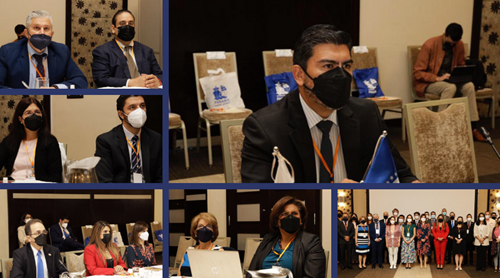
The VI Latin American and Caribbean Meeting of Logistic Port Communities, sponsored by the Permanent Secretariat of the Latin American and Caribbean Economic System (SELA), CAF-development bank of Latin America and the Panama Maritime Authority (AMP), focused its first round of presentations on 16 March on issues related to digital transformation, cybersecurity and sustainable development, as well as the outlook of the region after the crisis experienced in the sector as a result of the pandemic.
The Minister of Maritime Affairs and Administrator of the Panama Maritime Authority, Noriel Araúz, stressed the importance of discussing the digital transformation, cybersecurity and sustainable development of the port sector. In this sense, he urged to redouble efforts to advance in the pending and necessary tasks to strengthen the growth of ports in the region
For his part, Ricardo Sánchez, Senior Economic Affairs Officer of the International Trade and Integration Division of ECLAC, detailed that there is a recovery of port areas in Panama, Colombia and Uruguay, countries that have experienced a significant expansion in 2021 and show a recovery of the sector.
He explained that transshipment was a big winner in the region in 2021. There is also an increase in freight, which began to expand by an average of 12% in 2021. After the crisis, the variation has been similar with a significant recovery.
In addition to these figures, data presented by UNCTAD’s Economic Affairs Officer, Luisa Rodríguez, showed that the contraction of maritime trade in Latin America during the pandemic was 3.4%.
With regard to container freight, the drop in 2020 was -1.2%, with Europe and North America being the most affected. Then there were waves that complicated the panorama, but in Latin America the first impact observed is the significant reduction in port calls, which has a direct impact on port revenues and poses new challenges to ports.
Tomás Douglas, Advisor to the Panama Maritime Authority, pointed out that his country has implemented process automation with the acquisition of new equipment, such as electronic RMGs and Neopanamax RTGs, which facilitate efficiency in port operations. “The new strategies for ports should focus on governance, strategic alliances, logistics development, agro-industrial development, geopolitics, and global traffic,” he said.
According to Fausto Arroyo, Senior Executive of the Infrastructure Technical Analysis and Evaluation Department of CAF-development bank of Latin America, one of the lessons learned from the crisis as a result of the pandemic is that the port sector is essential for the economy, requires coordination of the logistics chain and cannot act in isolation. “This last year we have shown great resilience and capacity for recovery; likewise, the digitalization of the sector is fundamental, and the involvement of the private sector is essential,” he stressed.
He added that “this leads us to the need to promote collaborative governance in ports in order to facilitate and consolidate the port network as a key element for integration.”
The VI Meeting of Logistic Port Communities is part of SELA’s Work Programme for 2022-2026, specifically the programmes for economic integration and trade facilitation. The objective is to promote regional integration as well as to open a space for a permanent and proactive debate on logistic port communities in the regulatory, technical, technological, commercial and governance areas.
